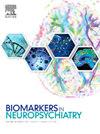社会和遗传背景变量与精神病神经认知生物标志物的关联
Q2 Medicine
引用次数: 0
摘要
社会经济(SES)和民族-种族因素可能倾向于不同背景的人的精神病诊断。临床诊断依赖于患者和信息提供者的报告,并被怀疑容易受到意外偏差的影响。使用实验室检查的诊断被认为是客观的。然而,社会不利因素会改变与精神病相关的大脑功能。实验室医学诊断中的种族和阶级偏见是一个值得关注的领域。为了探讨精神病诊断中的这些问题,我们描述了SES、种族/民族和祖先遗传背景与11个与DSM分类相关的综合实验室生物因子的关系,并区分了B-SNIP生物型。一系列的分析评估了社会因素和与祖先相关的遗传背景与这些生物因素的关系:(i)典型相关表明,社会地位和种族(一种社会结构)与认知表现和脑生理测量(显著的ERP值)密切相关(r2=.305);遗传背景既没有显著增加也没有改变这些关联的结构;(ii)回归模型表明,认知表现、内在大脑活动和ERP大小基本上或适度地由SES/种族/遗传背景预测,其中SES/种族对认知表现的方差最大(约为25% %);(iii)无论在鉴别诊断模型中是否包括SES/种族,在生物因子评分上,精神病生物型之间的组间差异在很大程度上(85 %)得以保留。对于DSM诊断,精神病组的差异保留了不到11% %。这些结果表明,社会因素与精神病相关的实验室测试有关。然而,社会经济地位/种族并没有实质性地改变精神病生物型的鉴别诊断。使用实验室测试进行精神病鉴别诊断,可以促进分层方法的有效性,有助于精神病神经生物学和环境风险的调查,并改善所有特发性精神病患者的治疗选择和方法。本文章由计算机程序翻译,如有差异,请以英文原文为准。
Associations of social and genetic background variables to neuro-cognitive biomarkers of psychosis
Socioeconomic (SES) and ethno-racial factors may tilt psychosis diagnoses for persons from different backgrounds. Clinical diagnoses depend on patient and informant reports and are suspected of being susceptible to unintended bias. Diagnoses using laboratory tests are thought to be objective. Social disadvantages, however, alter brain functions related to psychosis. Race and class bias in laboratory medical diagnostics is an area of concern. To probe these issues for psychosis diagnoses, we describe relationships of SES, race/ethnicity, and ancestral genetic background to 11 integrated laboratory bio-factors that are associated with DSM categories and distinguish B-SNIP Biotypes. A series of analyses evaluated relationships of social factors and ancestry-related genetic background to those bio-factors: (i) canonical correlation revealed that SES and race (a social construct) are strongly associated (r2=.305) with cognitive performance and measures of brain physiology (prominently ERP magnitudes); genetic background neither significantly added to nor altered the structure of those associations; (ii) regression models illustrated that cognitive performance, intrinsic brain activity, and ERP magnitudes are substantially to modestly predicted by SES/race/genetic background, with SES/race accounting for the most variance on cognitive performance (approximately 25 %); (iii) regardless of including SES/race in differential diagnosis models, group differences between psychosis Biotypes were largely (85 %) preserved on bio-factor scores. For DSM diagnoses, less than 11 % of psychosis group differences were preserved. These outcomes illustrate that social factors are associated with psychosis-related laboratory tests. Nevertheless, SES/race did not substantially modify differential diagnosis of psychosis Biotypes. Using laboratory tests for psychosis differential diagnosis may facilitate the usefulness of stratification approaches, aid investigations of psychosis neurobiology and environmental risk, and improve treatment selections and approaches for all persons suffering with idiopathic psychosis.
求助全文
通过发布文献求助,成功后即可免费获取论文全文。
去求助
来源期刊

Biomarkers in Neuropsychiatry
Medicine-Psychiatry and Mental Health
CiteScore
4.00
自引率
0.00%
发文量
12
审稿时长
7 weeks
 求助内容:
求助内容: 应助结果提醒方式:
应助结果提醒方式:


